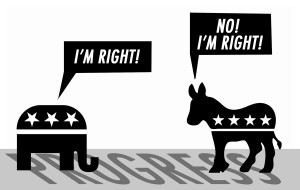Public debate should be geared toward audience
I set out with a simple idea when I began this project in August — to focus on domestic political disputes through the lens of nonpartisanship.
“It is a rare day when both parties can initially come together in support of a policy, but it is an even rarer day when one party truly has a monopoly on being right,” I wrote around then.
Producing a column is not about arguing what you believe is right — rather, it is about arguing for what you believe. The difference is significant because an argument, a statement and even a column are all the beginnings of a discussion, and beginning a discussion having predetermined what is “right” does not a productive discussion produce. Instead, beginning a conversation with what you believe and accepting that you are often not right gives that discussion enormous potential.
“Not right” is different from “wrong.” To believe you are “right” is to believe that you have made a statement that is totally immune to criticism and has no potential to be improved. This is different from arguing what you believe and accepting that the arguments of those who disagree with you might not change your mind but could make your argument stronger.
Here’s an example. In my column last week, I argued that the Supreme Court decided wrongly in upholding a voter-initiated ban on affirmative action in the state of Michigan. I offered several reasons why I believed affirmative action was necessary to promote diversity and correct several structural inequalities in society. To date, a thread with over 95 comments has emerged on social media, with participants passionately defending each side of the debate over affirmative action. Second and third-year law and Ph.D. students dropped their homework and finals studying and older folks dropped their real jobs to write responses to each other’s arguments that exceeded the length of my original column by hundreds of words.
The result was incredible. Regardless of whether or not anyone who participated in the conversation changed his or her views on affirmative action in a meaningful way (I suspect that everyone still possesses the same fundamental conviction), that does not change the fact that the conversation occurred. When a conversation takes place, the intent is not solely to convince the person on the other side but also those listening.
This is another dimension to this conversational model that is perhaps more important than the views of the participants — the views of the observers. A public conversation does not occur in a vacuum — there are always those who are still learning about the issue, decidedly undecided or ignorant — but in all three of those cases, civil conversation serves an important role. This doesn’t even have to be applied to the political model — all too many times, basic interactions from group projects in school to agreements between friends are derailed by the decision to be immovable on a particular issue.
This would all be easier if people understood that being “the most right” on an issue doesn’t help in any capacity if you haven’t managed to convince anyone else to support you. In our hypothetical group project, if only one person wants to present with a PowerPoint, even if that person is right that a PowerPoint would be the best way to present, the other people in the group are going to do an awful job, and no one wins.
But speaking of the political model, where only 40 percent of eligible citizens vote in presidential elections, the elected officials who choose the “being right” mentality over the “believe” mentality will swim, and the ones who continue to be staunchly partisan will sink. The country is more diverse, election reforms in states such as California are making it harder to be far left or far right and still win and this Congress has been one of the most unproductive in 100 years.
There are clearly arguments on which compromise is impossible, but to which the conversational model I’ve articulated still applies — racism, sexism and homophobia should be bitterly contested with unwavering resolve. But consider the goal of a conversation with someone who unfortunately has one of those traits — if the goal is to cause them to change their mind, then having a conversation is still important. The “being right” mentality would dictate that the conversation not occur in the first place, a dangerous situation that allows such atrocious views to continue unchallenged.
Nathaniel Haas is a sophomore majoring in economics and political science. His column, “State of the Union,” ran Thursdays.


